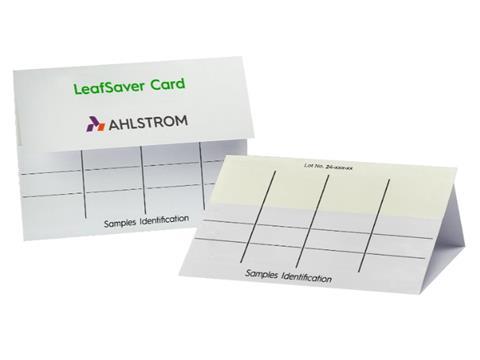
Ahlstrom has revealed LeafSaver, a specimen collection card designed to store and transport DNA samples from plants, fungi, insects, and parasites at ambient temperatures – thus reducing the environmental impacts and costs of cold chain transportation, the company says.
By preserving nucleic acid samples, researchers can examine an organism’s genetic makeup. However, if stored incorrectly, some specimens can degrade too quickly to be studied.
LeafSaver is said to allow researchers to place a specimen directly onto the designated area of a collection paper, then close and seal it once the sample has dried. Therefore, it is intended to be easy to use for fieldwork, remote expeditions, or in any context wherein access to laboratory facilities is limited.
It can apparently preserve DNA at ambient temperatures and negate the need for specialized storage conditions; as such, it is thought to simplify logistics, lower costs, and achieve environmental benefits.
According to Ahlstrom, specimens of various species and sample types can be preserved for over twenty years. The collection paper also claims to enable reliable DNA recovery over time while also protecting biological samples and avoiding cross-contamination.
LeafSaver is designed to allow users to ship it through standard postage processes without needing to apply a plastic envelope, bag, or other external wrapping. It can also be customized upon request to meet individual customer needs, Ahlstrom emphasizes.
“The LeafSaver card represents a significant advancement in plant, fungi, insect, and parasite DNA preservation technology,” says EVP Healthcare Jacques Lafon. “Its innovative design and ease of use empower researchers to collect and preserve high-quality DNA samples with minimal difficulty, ultimately accelerating discoveries across various fields, including agriculture, environmental science, botany, and beyond.”
Another development in the life sciences industry saw Neste and Eppendorf enter a strategic partnership to replace fossil feedstock with a renewable alternative; this would be used to manufacture plastic tubes, filter pipette tips, and other consumables.
Meanwhile, Unconventional Ventures, LRF Ventures, Almi Invest GreenTech, and industry angels have invested €1.76 million into Saveggy in order to develop its edible, plant-based coating for fruits and vegetables. This solution is set to extend their shelf life.
If you liked this story, you might also enjoy:
Report: The ultimate guide to global plastic sustainability regulation
The Brief: Oxo-(bio)degradables: the who, what, and why of breaking down fossil-based plastics
Sustainable Packaging Summit: How Kraft-Heinz uses collaboration to drive innovation
The Brief: Using ocean-bound plastic in packaging – how, why and should we?














No comments yet